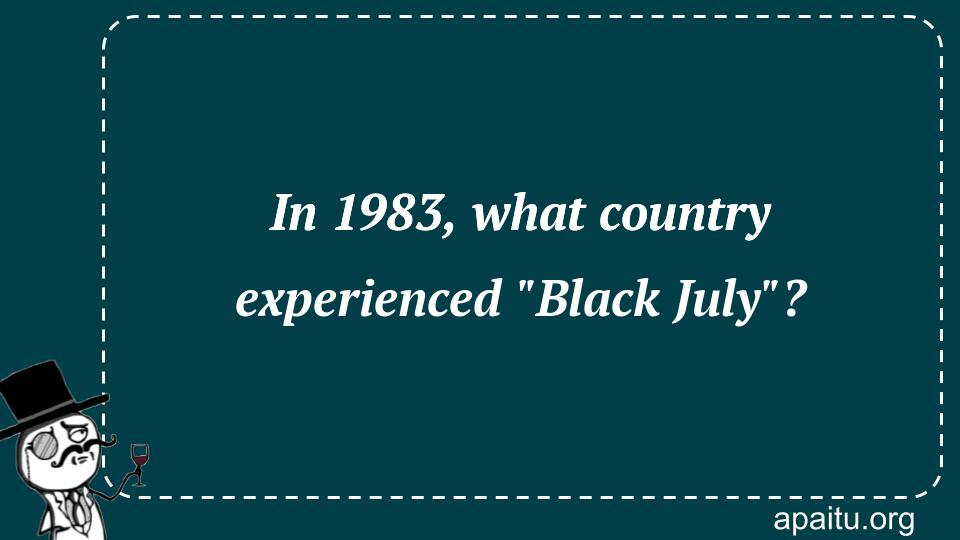Question
Here is the question : IN 1983, WHAT COUNTRY EXPERIENCED “BLACK JULY”?
Option
Here is the option for the question :
- Sri Lanka
- Kazakhstan
- Egypt
- Bolivia
The Answer:
And, the answer for the the question is :
Explanation:
The Sinhalese majority in Sri Lanka went on a rampage in July 1983 when Tamil militants attacked a number of soldiers. The month of July experienced these occurrences, and it was dubbed “Black July.” The skirmishes quickly turned bloody, leading to a full-scale civil war that lasted for 26 years before finally ending in 2009.

In July 1983, Sri Lanka experienced a period of violent unrest and civil unrest known as “Black July.” The events of that month were sparked by a terrorist attack on the Sri Lankan Army by the Liberation Tigers of Tamil Eelam (LTTE), a militant group seeking a separate state for Sri Lanka’s Tamil minority.
The attack resulted in the deaths of 13 soldiers and set off a wave of violence and retaliation against Sri Lanka’s Tamil population. Over the course of several days, mobs of Sinhalese nationalists, with the apparent support of the Sri Lankan government, carried out a series of brutal attacks against Tamil civilians, businesses, and homes. The violence spread throughout the country, with reports of Tamil men, women, and children being beaten, burned alive, and hacked to death by mobs wielding machetes and other weapons.
The Sri Lankan government declared a state of emergency and deployed the military to restore order, but reports suggest that security forces were complicit in the violence and may have even participated in some of the attacks. The violence continued for several weeks, with estimates of the death toll ranging from 400 to 3,000 people. Tens of thousands of Tamils were displaced from their homes and forced to flee the violence.
The events of Black July had a profound impact on Sri Lanka’s ethnic tensions and political landscape. The violence was seen by many Tamils as evidence of the government’s hostility towards their community and fueled support for the LTTE’sarmed struggle for a separate Tamil state. The Sri Lankan government’s response to the violence also drew criticism from the international community, with many countries condemning the attacks and calling for an end to the discrimination and violence against Tamils.
The aftermath of Black July saw a significant increase in the number of Tamils seeking asylum in other countries and a rise in support for Tamil separatist movements both within Sri Lanka and abroad. The violence also marked the beginning of a long and bloody civil war between the Sri Lankan government and the LTTE, which lasted for over 25 years and resulted in the deaths of tens of thousands of people.
In recent years, Sri Lanka has made efforts to address the legacy of Black July and promote reconciliation between the country’s different ethnic and religious groups. In 2015, the Sri Lankan government established an Office of National Unity and Reconciliation to promote dialogue and understanding between different communities, and in 2017 the government passed a law establishing an Office of Reparations to provide compensation for those affected by the violence.
however, tensions between Sri Lanka’s different communities remain high, and the legacy of Black July continues to be felt today. The events of 1983 serve as a stark reminder of the devastating impact that ethnic violence and discrimination can have on individuals, communities, and entire countries, and the impo